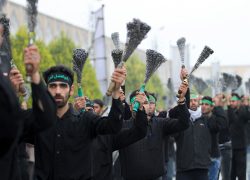Archive Isfahan

For days, Isfahan has been adorned with the phrase "24,000 and Me," a testament to the upcoming event that has captured the city's attention
The National Congress of 24000 Martyrs of Isfahan
For days, Isfahan has been adorned with the phrase “24,000 and Me,” a testament to the upcoming event that has captured the city’s attention. Making my way to The Isfahan Musalla. As I turned onto Ayatollah Khansari Street, I was greeted by a heartwarming sight: volunteers eagerly assisting those in need, pushing wheelchairs and offering a helping hand. Every few steps, a new stall beckoned, each a testament to the community’s involvement.

Shahid Ejei Cultural Center of Isfahan: Forging a Path of Resistance
The Art of Defiance: A Lesson to Be Learned
In this article, we delve into the endeavors of an NGO in Isfahan, a collective of activists from the Shahid Ejei Cultural Center. They have been actively engaging with the city’s youth, fostering connections within schools. Mohammad Saber Pestei, a leading member of the center, shared with “Isfahan-e Ziba” the recent initiatives undertaken to cultivate a culture of resistance.

The history of the development of the city of Isfahan
As the third largest city in Iran, after Tehran and Mashhad, Isfahan is located in the center and heart of Iran.

The Knowledge of Brewing Traditional Nooshabadi Coffee:
The Heritage Drink!
Coffee has been popular in Nooshabad since about 450 to 500 years ago; however, it is not known when Nooshabadi coffee and its modern brewing method was invented.

The Skill of Chickpea Processing in Khomeini Shahr:
Chickpea Souvenirs!
Chickpea seeds are naturally hard and inedible, but in a few steps, they are turned into a delicious snack called nokhodchi (processed chickpeas).

Ta'ziyeh Dramas of Khomeyni Shahr:
A Tragedy Series
The ta’ziyeh dramas of Khomeyni Shahr are among the most spectacular ta’ziyeh performances in Isfahan Province, especially for photographers and tourists.

The Ritual of Hoom Babaei:
Children’s Myths of Ramadan
Nowadays, this belief has become a tradition, and on this night, a number of children, teenagers, and young people, called the Hoom Babaei group, go to the doors of houses after iftar and ask for help for the people in need.

The Traditional Ritual of Jirjirouni in Dastjerd Village:
The Proof of the Pudding Is in the Eating
The 27th of Ramadan is the best time to visit Dastjerd Village in Jarqavieh Olya District, which is located in the southeast of Isfahan, and participate in the Jirjirouni Ceremony.

A Muharram Ritual in Kashan:
Hexagon on the Shoulders
When it comes to the Muharram rituals of Kashan, the sixth day of Muharram is dedicated to carrying the hexagon.

The Ritual of Zanjir-Zani in Rehnan:
Mourners’ March in Rehnan
Rehnan is a historical district in the western part of Isfahan City. It is at a distance of about 10 km from the center of the city.

The Ritual of Cooking Samanou in Shahreza:
Winter’s Charity
Cooking samanou in Shahreza is more common in winter, on the nights of the death or birth anniversaries of the Imams, and in the last week of the year for the Nowruz table.

A Rainmaking Ritual in Azaran Village, Kashan County:
Staring at the Sky
Having disappeared in most parts of Iran, the celebration of Abrizan (Tirgan) is still breathing in a valley named Abderaz, which stretches on the slopes of Mount Chal-Azaran, the second highest mountain of Kashan.






